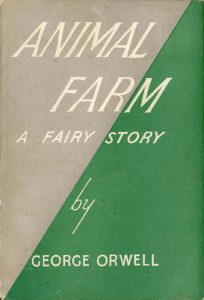Find a list of the best 20th-century novels, and you’re likely to find both George Orwell’s 1984 and his Animal Farm. The former, published in 1949, is such a classic of dystopian literature that it’s hit the top of Amazon’s bestseller lists twice in the last four years. Yet his first tale of dictatorships, Animal Farm, struggled to find a publisher due to World War II politics.
For those unfamiliar with it, Animal Farm is a tale of a group of farm animals overthrowing the farmer to create a society where they are all equal and share the fruits of their labor. Ultimately, though, the farm ends up under a dictatorship whose motto is “All animals are equal, but some animals are more equal than others.”

First edition of Animal Farm
As Britain was still at war with Germany, the British government and public opinion supported the Soviet war effort. And the fear of upsetting the Anglo-Soviet alliance led to Orwell having difficulty getting Animal Farm published. He said four publishers rejected it. One, Jonathan Cape, actually accepted the book but, after consulting with the British Ministry of Information, believed it “highly ill-advised to publish at the present time.” The founder wrote Orwell:
If the fable were addressed generally to dictators and dictatorships at large then publication would be all right, but the fable does follow, as I see now, so completely the progress of the Russian Soviets and their two dictators [Lenin and Stalin], that it can apply only to Russia, to the exclusion of the other dictatorships. Another thing: it would be less offensive if the predominant caste in the fable were not pigs. I think the choice of pigs as the ruling caste will no doubt give offence to many people, and particularly to anyone who is a bit touchy, as undoubtedly the Russians are.
Ironically, the ministry official with whom Cape consulted was later revealed to be a Soviet spy, according to D.J. Taylor’s 2003 book, Orwell: The Life.
In mid-July 1943, T.S. Eliot, on the board of another publishing firm, wrote Orwell of that firm’s rejection of the book. “[W]e have no conviction … that this is the right point of view from which to criticise the political situation at the present time,” Eliot wrote. He also told Orwell the book’s viewpoint, “which I take to be generally Trotskyite, is not convincing.”
Secker & Warburg, considered to be anti-fascist and anti-Soviet, eventually published Animal Farm – on August 17, 1946, more than three months after the war in Europe ended. Orwell wrote a proposed preface called “The Freedom of the Press,” telling of the difficulty publishing anything considered anti-Soviet, a situation, he said, in which “the principle of free speech lapses.” Even though the book’s proofs left space for it, the preface wasn’t published. Discovered in 1972, The Times Literary Supplement published it in September that year.
Animal Farm’s publications in Britain didn’t mean clear sailing. At least three American publishers turned it down. Harcourt Brace finally published it in 1946. It was a Book-of-the-Month Club selection and hasn’t been out of print since. Someone published some 5,000 copies of a Ukrainian translation in Germany in March 1947. The American military confiscated 3,000 copies and gave them to Soviet authorities, who destroyed them.
Sadly, Orwell’s struggle to publish Animal Farm supports what he wrote in his preface, “Unpopular ideas can be silenced, and inconvenient facts kept dark, without the need for any official ban.”
If liberty means anything at all it means the right to tell people what they do not want to hear.
George Orwell, Animal Farm
(This post originally appeared at Exploring History.)







